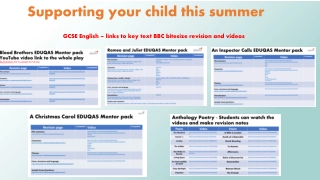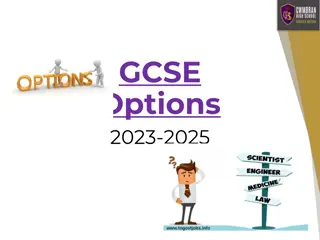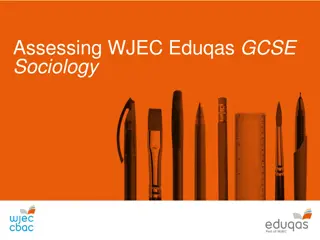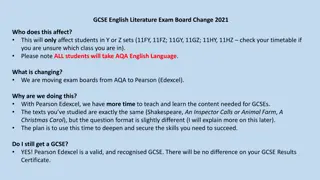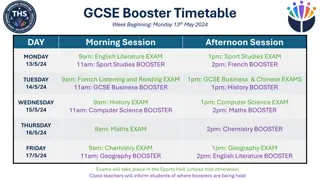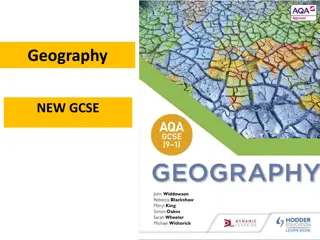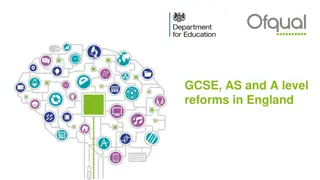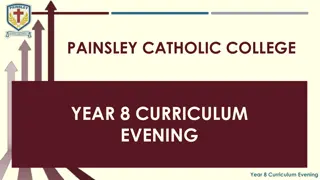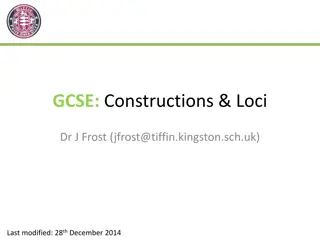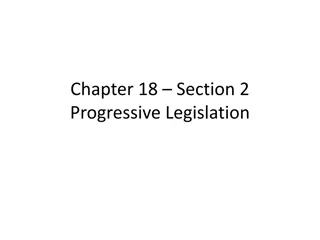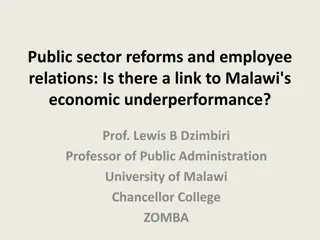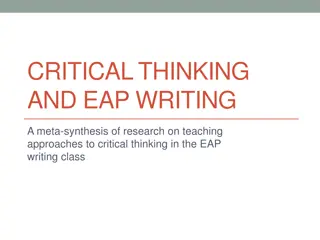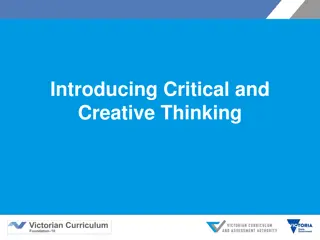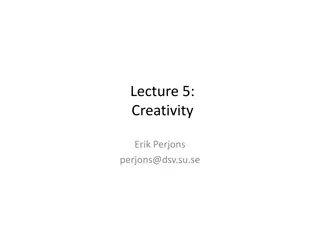World Class Thinking, World Class Achieving - Introduction to GCSE Reforms
Reformed GCSEs are shaping education, transitioning to a new grading system from A* to G to 9 to 1. Understand the benefits, exam changes, and strategies for English Language exams at St. Mary's College. Dive into results analysis and supporting your child's learning journey in English.
Download Presentation

Please find below an Image/Link to download the presentation.
The content on the website is provided AS IS for your information and personal use only. It may not be sold, licensed, or shared on other websites without obtaining consent from the author.If you encounter any issues during the download, it is possible that the publisher has removed the file from their server.
You are allowed to download the files provided on this website for personal or commercial use, subject to the condition that they are used lawfully. All files are the property of their respective owners.
The content on the website is provided AS IS for your information and personal use only. It may not be sold, licensed, or shared on other websites without obtaining consent from the author.
E N D
Presentation Transcript
New GCSEs: An introduction Reformed GCSEs are being introduced gradually over three years and started in September 2015. They will be graded from 9 to 1, instead of A* to G. (Students taking GCSEs over this period will therefore receive a mixture of 9 to 1 and A* to G grades.) Coursework has been largely removed and exams tend to be longer and greater in number. Exams are linear (sat at the end of courses). Figure a: Comparison of current and revised grading structures with reference points for analysis1 World class thinking. World class achieving.
World class thinking. World class achieving. English Language Exam- Year 10 Information
English at SMC- Year 10 updates All Year 10 students are working towards early entry for their GCSE English Language qualification. What are the benefits of early entry? What will my child have to do in their exams? Language Paper 1: Explorations in Creative reading and writing Language Paper 2: Writers viewpoints and perspectives World class thinking. World class achieving.
Why? Our results in English: National SMC Y11 2020 SMC Y11 2019 SMC Y11 2018 Students achieving Grade 4+ Students achieving Grade 5+ Students achieving Grade 7+ 60% 75% 72% 79% - 59% 56% 55% 13% 16% 14% 15% World class thinking. World class achieving.
English at SMC: What can I do to support my child? Revision strategies and techniques Homework tasks Revision guides SMC English Twitter feed: @StMarysEnglish World class thinking. World class achieving.
Humanities at SMC: Year 10 updates Geography History What will my child have to do in their exams? Component 1: Examination on 3 out of a possible 11 Geography topics Paper 1: Medicine in Britain c.1250- present and The British Sector of the Western Front / WW1 Component 2: Examination on problem solving Paper 2: The American West c.1835- 1895. shortened to 55 minutes due to the removal of the 'Elizabeth' content. Component 3: Examination on fieldwork - shortened to 1 hour 15 minutes as no actual fieldwork was carried out. This paper is now all theoretical. Paper 3: Weimar and Nazi Germany, 1918-39 World class thinking. World class achieving.
Humanities at SMC: What can I do to support my child? Progress support sessions in History and Geography for selected cohorts on a Wednesday form time and Wednesday lunch History and Geography revision: Tuesday lunch and after school. All are welcome to attend! SMC Geography Twitter feed: @geography_smc Weekly homework tasks Revision guides SMC History Twitter feed: @SMCHistoryDept Post mock feedback Ask your teacher for extra exam questions World class thinking. World class achieving.
World class thinking. World class achieving. Revision and exam preparation
Doing Your Revision Active revision is the most effective way to revise don t just sit there, do something! Revise with the exam in mind practice exam questions, complete them in timed conditions. Write your own revision notes summarise the information you have to learn first. Use your revision notes to test and re-test yourself. Take advantage of technology there are lots of great apps and websites to help you. Take advantage of revision sessions in school. World class thinking. World class achieving.
How should I spend an hour revising? ? By using the memory clock!
What is the memory clock? This is our recommendation of how to spend each hour when revising. Students can engage in ineffective revision which can limit their performance in examinations. Also, we are aware that it can be challenging to change students ingrained study habits. Therefore, we have designed a simple model to help clarify the most effective strategies and what these might look like over a period of an hour. It is our hope that this will help inform all students about the most effective strategies.
The memory clock explained... Firstly review The first part of the clock focuses on the process of reviewing what needs to be learned. Planning is important to ensure that students have time to cover all topics, and this includes the consideration of spacing out and interleaving revision, rather than mass- revising topics. The review should only be short. Avoid spending an hour reading and highlighting notes as this is called passive revision. Instead only spend 15 minutes reviewing a topic. Then practice Possibly the most important part of the process, how are you supposed to know what topics you know if you do not test yourself? You should spend 15 minutes practicing a topic. Consider doing the following? Quizzes Self testing through revision cards Completing practice exam questions (without your notes). Finally check Finally you should check your work. This highlights the need for you to correct yourself. This supports your learning by identifying any misconceptions or mistakes that need to be changed in order to be successful. Although initially you may not be very good, this is the most important part of the learning process. If you know you are poor at a topic you can allocate more time to it.
Some examples.. Some examples.. GEOGRAPHY
ENGLISH MVQ = multiple choice questions
Condensing notes using the Cornell method. Look at the example on the left or click below for a video explanation of how this works. https://www.youtube.com/watch?v=ogH IyREqLd4
Create a Revision Timetable What s the point? Avoids a last-minute rush Sets up a routine and makes you discipline yourself Allows you to share revision time between subjects Ensures you keep on top of revision Spreads out revision (avoids cramming!) Creates a balance between revision and leisure time Avoids time-wasting deciding what you re going to revise. World class thinking. World class achieving.
Create a Revision Timetable How do I do it? Divide up your day into sections, but plan in lessons, other study, clubs and importantly, social/relaxation time Draw up a trial timetable and review it after one week. If it doesn t work, redraft it. Review your timetable at the end of each week Put it somewhere prominent in your room World class thinking. World class achieving.
Organising Revision Sessions Make a topic checklist Set a start and finish time and stick to it Put your phone in a different room! Exercise some self-control if using a laptop/tablet an hour on Facebook does not equate to an hour s revision! Start with shorter sessions and build up to bigger ones Take regular breaks Reward yourself give yourself something to work towards World class thinking. World class achieving.
Online revision tools. Quizzizz Online quiz maker can share with friends and test each other. Also many ready-made quizzes. https://quizizz.com Quizlet Online flash card generator. Also lots of pre-made quizzes on a variety of curriculum topics. www.padlet.com BBC Bitesize www.bbc.co.uk/bitesize. Lots of revision for a variety of GCSE topics Oak Academy https://www.thenational.academy/, The Government's national academy. Lots of lessons to help with revision.
Other revision ideas. Spaced Practice Try to create mind maps of things you did last lesson, last week, last month. Where there are gaps, go through your notes and fill them in. Revise from your new sheet and repeat the exercise next week. List of 10 Go to the exam board's website and look at past papers. For each question, try to think of 10 things you would put in and why? Bounce back text your friends questions. If they get it right, they can "bounce back" a question of their own (or create a Quizzizz revision quiz for them to do). Practice questions and exams. This is the best way. Do as many as you can. Create your own exam questions and answers check them with your teachers.
Coping with Stress Talk about it Take time out to have fun Exercise regularly Think positively Eat well and keep hydrated Use breathing techniques to help you relax World class thinking. World class achieving.
How can parents and carers help? Discuss with your child how you could help them Provide the right environment for success quiet and well-lit if possible Give plenty of praise and encouragement Keep your child well supplied with food and drink Be prepared to listen Encourage regular breaks during long periods of revision Encourage morning revision over late evening revision brains tend to be more receptive in the morning World class thinking. World class achieving.
World Of Work (WOW) Second week in July for Year 10 Due to the Covid-19 pandemic, work experience is not likely to be a viable option for this year s cohort of Y10 students. Nevertheless, there is a still a need to prepare our students for the career path that lies ahead of them and hopefully help them feel equipped to make their first steps into the workplace.
Whilst it is impossible to replicate the experience of spending time in the workplace, we can endeavour to give students an insight into the world of work and help them to understand themselves and the types of study and work that may suit them in the future. With this in mind, we are planning a World of Work [WOW] focus week, supported by a bank of online and virtual work experience resources, substituting some of the experience they should have received.
Our WOW focus week will include supporting students to: Profile themselves and consider their strengths and aptitudes Investigate Career Pathways Prepare for Year 11 and Beyond Explore Labour Market Information Observe A Day in the Life of
How will it work? Some of the sessions will be delivered during class time, whilst others are designed to be completed in the students own time so they can build the experience they want. In addition, all students have a login to our Unifrog careers platform which will help students to use, develop and enhance their research skills, and apply those skills in their study programmes.
Unifrog Unifrog is our new online resource. It helps students plan their future by bringing all the available information into one single, impartial, user-friendly platform. It supports and enables students to make the best choices and submit the strongest CVs, UCAS and job applications. www.unifrog.org
Careers e-Library https://nationalcareersservice.direct.gov.uk/job-profiles/home - look at the "Job Profiles" section. Factual up to date information about careers. http://www.bestcourse4me.com/ - gives help with "A" level, degree and career choices. http://www.careerpilot.org.uk/ - gives help with choices at 14, 16 and beyond. http://www.icould.com/ - general careers advice and short careers film clips. http://www.tomorrowsengineers.org.uk/ - information on everything to do with engineering careers. http://www.apprenticeships.org.uk/ - access to the national apprenticeships database and general information. http://www.ucas.com/ - all university information and websites. http://www.careersbox.co.uk/ - short careers film clips. http://www.russellgroup.ac.uk/ - to access 'Informed Choices' booklet which gives definitive information on GCSEs, 'A' Level and I.B. subject choices. https://www.unifrog.org/student http://movingonmagazine.co.uk/ https://successatschool.org/advice/subjects


